
Has it really been three years already?!?
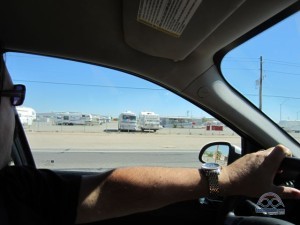
It seems like just yesterday we were roaming around the country on a month long Amtrak pass searching for a vintage bus to become our next home on wheels.
After 4 years of traveling in smaller travel trailers and having just spent a winter living in the US Virgin Islands, we knew that we were not ready give up life on the road. We were however ready for more mobile space.
Just not too much space.
We fantasized about finding a motorhome in the 25′ – 32′ range, and we really had no interest in either slides or class-C style rigs. We just wanted a solidly built comfortable home optimized for two working-on-the-road geeks.
Unfortunately, new or used, none of the commercially manufactured rigs we had ever seen really appealed to us at all. Usable “work” space was unheard of, and typical construction standards in our target price range seemed more suited to three-weekends-a-year usage, not full time living.
The desire for a more solidly built home inevitably led us to bus conversions, and our desire to stay as small as feasible is actually what first led us to vintage buses. We had to go way back to the 60’s when 35′ buses were common to find buses we liked, and at first even 35′ felt too big. Modern buses are more typically 40′ or 45′ — way too large for us!
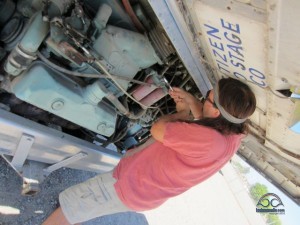
Along the way – we fell in love with the styling and uniqueness of vintage buses, and we began to love the idea of keeping an old classic alive and on the road.
We figured if we could find a livable vintage bus conversion, we could then invest our money into modifying it – building our own ideal high tech home on wheels, our way.
Three years ago today, after a lot of (literal!) blood, sweat, and tears learning to prime a 2-stroke diesel engine to even take a short test drive – we handed over $8000 in cash in parking lot in exchange for the title to a 1961 GM 4106 and a bill of sale scribbled on scrap paper.
We looked at each other, not sure if we should celebrate or freak out… we now owned a bus older than we are!
It was a mystery bus without much known mechanical history, and we were relative bus novices too with so much to come up to speed on. We were brave and crazy, and we loved it.
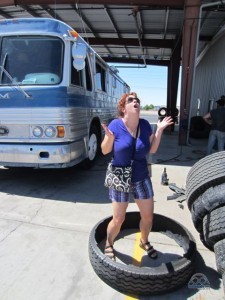
In the 115+ degree desert heat of Yuma, AZ we drove our new acquisition on its rotted tires to the nearest RV Park to start the adventure of figuring just what we had gotten ourselves into. And an adventure indeed it has been.
The bus that would eventually come to be known as ‘Zephyr’ immediately needed a lot of work to be road worthy – new tires & wheels, all fluids changed out, and all rubber replaced. We considered it all part of the acquisition cost of our bus, and not knowing much about diesel engines or the history of this one, we also immediately banked around $20k for the likelihood of major future engine work.
After having spent just $8,000 to buy her – we still felt like we were getting a good deal.
Costs of Zephyr
We get asked all of the time how much it costs to acquire, maintain, and remodel a bus conversion. And while that’s a personal question unique to our own style and approach – we’ve been happy to share along the way.
Here’s all of the costs we’ve incurred on bringing Zephyr up to date, ongoing maintenance, and our remodeling projects to make her our own:
(For those reading in RSS or e-mail delivery, you may need to click through to the full post to see the embedded spread sheet.)
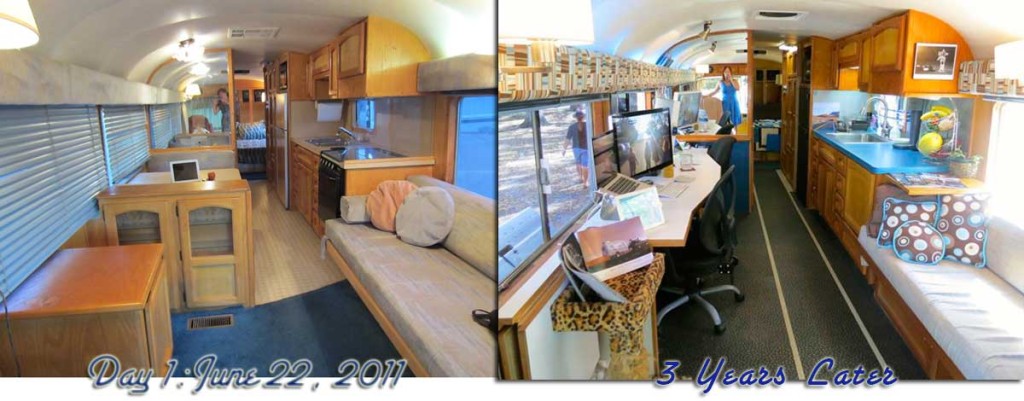
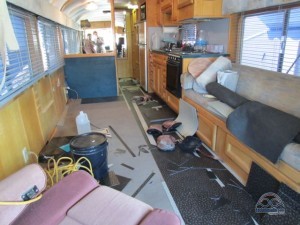
All and all, we’re pleased as punch with what we’ve spent, and we feel we’re under budget from what we projected our costs would be when we approached this project three years ago. Yes – we know that we could have done it a LOT cheaper, and we could have also spent way more as well.
But we did it our way (queue Frank Sinatra!) – striking our own balance of do-it-yourself and professional work, with costs spread out over a few years.
Of course, we also still have some major projects left to complete – solar panels (coming soon!), upgrading the lithium ion battery bank, and eventually adding a diesel hydronic heating system (but honestly, we’ve been rocking it with an electric space heater and running the water heater off electric).
Some other cost metrics for the past 3 years:
- 22,615 miles traveled (average of 7538/year)
- $13,136 spent on fuel (average of $4378/year)
- 3100 gallons of diesel (average of 1033/year)
- Average fuel economy: 7.29 mpg
Prior to the bus, we traveled with a truck/Jeep and trailer combination, and did get much better fuel economy (often 12-18 mpg).
But we also used to travel 10-13k miles a year in those setups. With the change to the bus, we intended to slow down the pace to 8-9k miles per year – and we’ve exceeded that with averaging out at around 7500. We put about the same mileage per year on our MINI Cooper, which gets 33+ mpg. Zephyr plus the Mini has proven to be a great setup for us.
Update: Other major projects we’ve completed since this post:
800 Watt RV Bus Roof Solar Install
Summer 2015 Bus Renovations Tour & Project List (repainting, hydronics, windows, etc.)
Reflections on 3-Years
It’s been an amazing 3 years living and traveling in Zephyr. We’ve been able to balance working on bus projects in stages while incorporating in a life full of exploration, work projects and quality time with amazing people.
Some of the unexpected attributes of the past 3 years in a vintage bus:
- Each bus project represents a different story in place and time – a unique memory and personal touch from whoever serendipity brought into our lives to help us out with it. We look around at what we’ve created, and it’s really a bus that has been built by a network of friends made across the country.
- How admired Zephyr has been – whether driving down the road and gaining smiles & waves from passerby’s, or ogling in campgrounds or parking lots. We don’t seem to be able to make a stop without someone pointing at us, or approaching us. While we intentionally choose a unique looking substrate and usually enjoy it, there are honestly times we wish we could mask the bus to look like a more generic RV just to blend in a bit more. Maybe some Bounder camouflage?
- How accepted Zephyr is. So many folks warned us that driving an RV over 10 years old would get us kicked out of RV Parks. So far, it hasn’t happened once. The few RV Parks we’ve needed to stay at with the dreaded ‘over 10 year rule’ we call or e-mail ahead and send the park manager to our Zephyr page for a tour. We have always passed muster as being a restored and well maintained classic, not the feared ‘old’ RVs that might break down in their park and cause problems. That said, generally speaking, we favor places without such rules anyway.
- How much more comfortable it is to stay in commercial RV Parks than it ever was in our previous small trailers. With abundant & comfortable interior space, it’s easier to forget that we have another RV parked just feet away from us. Not that we necessarily enjoy the experience, but it has vastly opened up our options to be where we need to be without going stir crazy.
- How accessible parts have been. Owning a vintage bus can present challenges in finding parts when you need repairs or upgrades. Thus far, nearly every part we’ve needed replaced has been a fairly standard part obtainable with only a bit of searching. We can even generally find what we need in truck supply shops – thank you GM for using standard stuff! Yes, things will get scarcer as time goes on, but it has been easier than we feared. And the online community of fellow bus nuts is awesome when it comes to helping track things down!
Would we Do it Again?
This is now the longest we’ve lived in the same mobile vessel, and it’s hard to believe it’s already been 3 years. We really have no temptation to switch to anything else right now. We’re incredibly comfortable in this home on wheels we’ve built.
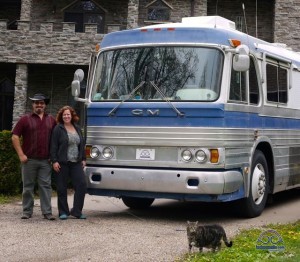
Sure, there are times we visit fellow RVing friends who have several slides, and we get envy at being able to host a group for an evening. But we then hear many of the same friends having substantial trouble with their slides, reminding ourselves why we specifically didn’t want slides in the first place.
We really are truly blessed to have found Zephyr on that hot summer day in Yuma – with such a well thought out the floor plan. So many have commented at how spacious and open she feels, despite being a 96″ narrow body 35′ coach. And the intelligently designed storage space we have is incredibly ample and efficient.
After now having attended several RV rallies and toured the coaches of many fellow RVers – we’ve yet to see a coach that even rivals what we have. Without getting into $250k+ (new price) coaches, we’ve not found anything that feels as close to the quality of our conversion or the amazing floor plan that works so well for us.
For the $75k we’ve put into Zephyr so far, we feel we have gotten one heck of a home on wheels that enjoys regularly changing awesome views.
So heck yes.. we’d do it again!
2015 Update (after our summer 2015 renovations): Is It Worthwhile to Renovate an Old RV? Why Not Just Buy New?
Should You Get a Vintage Bus?
We get asked this question all the time too, and have had folks write us letting us know they too purchased a bus after being inspired by us.
Owning a bus is an odyssey all its own, and a labor of love. It is definitely not for everyone.
Here are some things to keep in mind about a vintage bus:
-
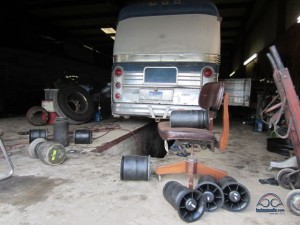
Constant maintenance. They were built for commercial service and are heavy duty machines meant to be maintained by a revenue generating business. Yes, you may be able to buy them fairly cheap – but there will be extensive costs & effort required to keep one on the road. We’ve been averaging about $2600/year in general maintenance – outside of major engine repairs or factoring in replacing tires every 6-7 years. This seems to be a bit more than what our friends with regular diesel pusher motorhomes pay, but we’ve not conducted an exhaustive survey on that. And an engine rebuild can easily set you back at least $8k if you luck into breaking down where you can do the work yourself – or upwards of $20k to have it done in a certified shop by a professional with a warranty.
- Skilled mechanics for older engines like our Detroit Diesel 8V71 2-stroke are aging out of the profession. These engines were still installed and used up until the mid-1980s, but are now becoming rare. If you take on a vintage engine, make sure you are soaking up resources, connections and skillsets as you go – you will need them! Make a point to get to know & participate in the bus conversion community, they can be your greatest asset for information when you need it.
-
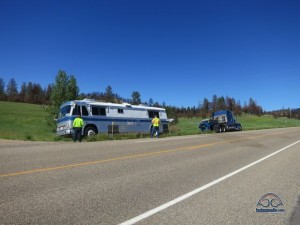
Do you have the resources (skills, patience and funds) to deal with this? You’ll hear this phrase over and over in regards to a diesel engine – ‘It’ll run and run and run, as long as you keep up with your preventative maintenance.’ Yeah well, true.. Until they don’t. There’s no guarantees that come with these things, and no extended warranty company is going to cover a coach this old. You’re on your own for all repairs, and there’s a lot that can go wrong – have a plan. Will a major break down take you off the road, or do you have the resources to deal with it? Are you willing to take the chance without having the cash tucked away to deal with major repair bills? Can you handle a disruption in your travels while you deal with an unexpected derailment? At the very least, make sure you have towing insurance – we use Coach-Net.
- No matter how much cash you throw at a vintage bus conversion, the return on that ‘investment’ is very low. A vintage bus, with rare exceptions, will still be a vintage bus at the end of the day. And it can take years to find a buyer for one if you ever do want to sell. Yes. Years.
Any house that is undergoing constant earthquake conditions is going to have problems that need to be corrected regularly – that’s just the nature of the beast with any RV. And each manufacturer and model will have its own challenges in getting service and parts.
With all the of the problems we’ve had with our bus – from two minor air system problems to a major engine rebuild, we can point to dozens of other major RV setbacks our friends have undergone too. Some actually even more extreme, more expensive and longer to take care of. A rebuild on a more modern diesel engine? It can also set you back $10-15k, but will probably present you with more accessible resources.
And heck, a regular sticks-n-bricks house can need major repairs and remodeling too. We look at our engine rebuild to be on par with a new roof on a house and some remodeling projects.
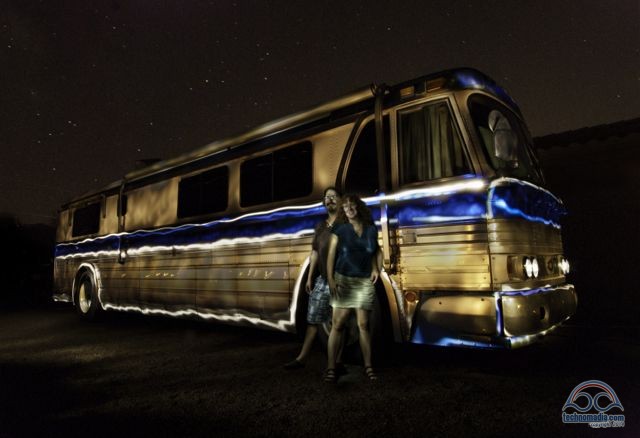
Thank you Zephyr, you’ve been an amazing partner on the road – cheers to many many more years together!
The Story of our Bus:
Why we sold our Oliver
Why a Vintage Bus?
Our Search for a Vintage Bus
Buying our Bus
To Tow or Not To Tow (a vehicle behind)
Remodeling & Projects:
Interior Remodeling: Round 1
Interior Remodeling: Round 2 — Dual Desk
Our Lithium Iron Battery (LFP) Research, Cost Analysis and Installation
7 Months in a Bus (Review of bus life, plus maintenance & remodeling costs so far)
Our Propane Free Goal
Kitchen & Bathroom Remodel
Project Dominoes — Simple Refrigerator Replacement sparks 33 other projects
Our Mobile Internet Gadgetry Setup
All of the Engine Rebuild Articles
Shopping & Installing RV Seats in Elkhart, IN
The Master Tech Marathon (major electrical re-wiring project)
New since this post:
800 Watt RV Bus Roof Solar Install
Summer 2015 Bus Renovations Tour & Project List
Take a Video Tour of our Bus (only slightly out of date):

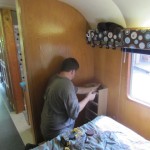
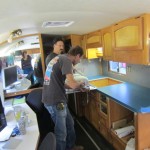
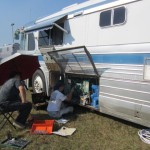
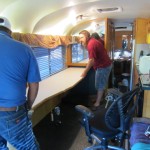
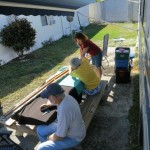
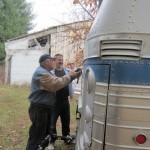
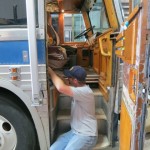
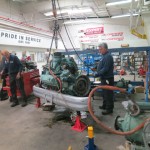

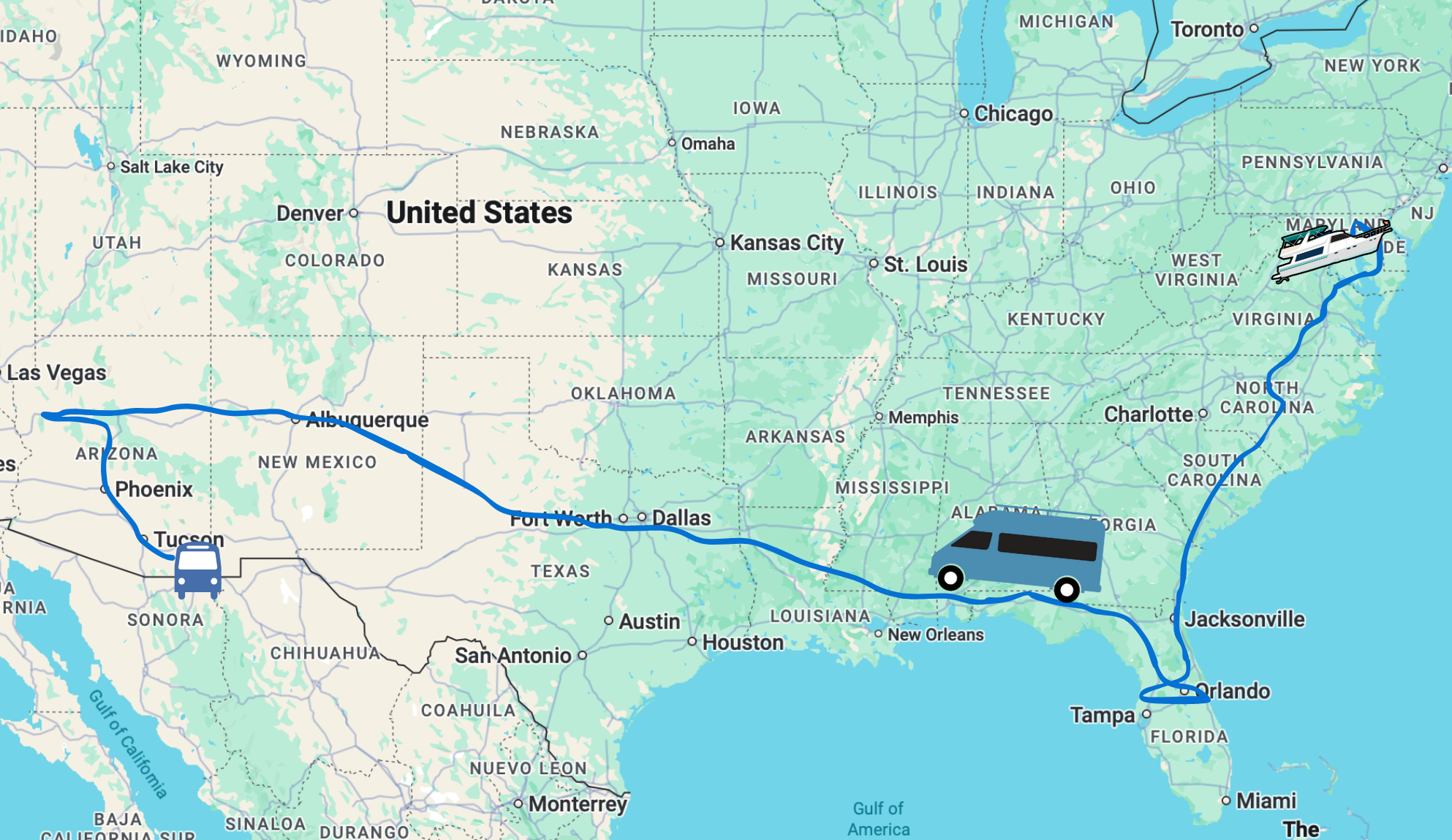
Hi Chris, Thanks for replying back. I stand corrected. You are right for someone who is mechanically inclined and a bit of a carpenter a bus conversion would be a good choice. I have also been a bus nut site junkie. I always thought putting money into a bus vs a older RV was a much better investment. Providing that you did not go over the top. Because should you ever have a change in plans and had to get off the road you would be able to recoup some if not most of your money back. Where as a RV depreciates so badly that it falls into the same category as a boat. As with anything there are exceptions. Such as airstreams which always were and still are very collectable and desirable. I also agree that there are some very good deals out there provided you know what to look for when inspecting one. Being a ex trucker and mechanic ( if there is such a thing as being a ex mechanic ..) I have saved a considerable amount over the 2 million miles I put down by wrenching on a lot of the problems and not having to call for road service. But maintenance is a lot higher than say your 1 ton towing a fifth wheel. I am still up in the air about what type of RV we are going to be going with when we are finally able to make the move out to the road. Funny how when I drove most of the time I could not wait to get home and get off the road. And now the road is calling me out again. Although this is a totally different adventure. It’s just funny how things work out. Sorry if I kind of got off the track a little. Any way thanks again for all the information that you guy’s put out and I will always be checking in from time to time finding answers to questions that come up. Also I know I probably should post this on the R Village site but I have to mention this. The most valuable aspect of the idea behind that site is knowing that you are never alone out there. Because when something unfortunate happens out in the middle of nowhere it is a nice comfort to know that there is a good chance that there is someone near by for help. Having spent a lot of time on the road alone I know how something like that is valuable. Thanks again.
Hi guy’s, I am becoming very impressed by the informative write ups on things that you experience. You cover the details completely leaving almost nothing out. You could have very easily posted how wonderful it is having a commercial vehicle that is made to run a million miles and purpose built for road travel. Most motor homes and trailers will not even come remotely close to that ability. But you also included the expense’s that go along with owning a commercial vehicle. That is definitely not for the faint at heart. It is also not for anyone living on a very low income. like you mentioned they are purpose built for business’s that produce the revenue that enables them to maintain them as well as produce a profit using them. I think what you are doing by providing all this information is a great tool for someone to use if they are planning to go full timing or even part time. Thank you for taking the time to provide all this valuable information.
Thanks for the comment Mitch.
To be fair – we do know several bus people making a great go of it on an extremely limited income. You can get a lot of machine for a song in the used bus world. But the key to making it work on a super low budget is having no tie to a schedule, and being willing and able to tackle even big projects on your own.
We’ve heard stories of bus nuts who’ve swapped their own blown engines over the course of a week while on a road trip, with surprisingly minimal investment.
If a person is that handy of a mechanic, a bus may actually be cheaper to work on than any traditional RV.
We like to strike a balance – we do a lot ourselves, but we invest in help when we need it – especially with the big stuff.
– Chris
Great write up guys!
We just picked up an 84 35′ Wanderlodge and are still trying to figure out how everything works! I have read tons about your mobile internet setup and the li-ion batteries. I really wish I could do something similar with the batteries, but I know nothing about this stuff. We are about to hit the road soon. Good luck to you to continue on your adventures!
Congrats on your new home on wheels.. and hopefully we’ll see you out there somewhere!
To see how many folks have done bus conversions from scratch there are many individual websites with detailed logs showing all stages of work done and discussing why that owner did things some particular way that are a treasure trove of information.
There are also websites that have this sort of information on many folks conversions. The two I would suggest for newcomers are the “Bus Projects” pages in the Forums at Bus Conversions Magazine noted above and Skoolie.net which is oriented at low cost DIY conversions of school buses but the information applies just as well to highway coach conversions.
edward
It is so wonderful to live in a age where we can all share in these high tech ways about our vintage bus projects 🙂
Nice post on your experience with your bus, it sure is sweet! You certainly are way ahead of us folks that bought a factory RV, and you’ll still be on the road years after the factory RVs are in the boneyard. ;c)
Looking forward to catching up with ya’ll in the road one day and seeing Zephyr live and in “person”!
Thanks.. not sure we’re ‘way ahead’ or not, all depends on perspective. But we sure are happy 🙂
Awesome right up. Thanks for sharing!
Thanks guys.. hope your new/old home in WA is wonderful!
Great, honest write-up! As we’ve watched, read, followed along, and learned from you guys, our dreams continue to fade in and out. We are so glad to be learning the pros and cons, as we follow our current dream, while trying to decide on future dreams.
Thank you for bringing your guest bedroom with you, for sharing your world, for laughter, love, and dragons. 🙂
K, K, & P
There’s a bus down the road with your name on it 🙂
Happy Anniversary! Your home is beautiful. I especially like the custom desk/workspace.
Thanks for sharing
Thank you 🙂 The desk has definitely worked out very well for us.
A well-done article! Thanks for “keeping it real” in regards to the pros and cons of full-timing in a bus, especially as it concerns costs. Many other full-time RV sites make the lifestyle sound nothing sort of idyllic, however, nary a word about what it takes, financially and otherwise, to keep it on the road. Thanks for both your honesty and all the information you’ve given concerning your life in the Zephyr.
Aww… thanks. Comments likes yours keep us motivated to continue sharing the details.
Hi,
Great post…. I live up here in the northwest, so we have Northwest bus sales. And ever so often they have an older bus for sale 60s or 70s, and I go to take a look. But with the weather we have up here, they are rotten from the bottom up. But I think I will go with a older Wanderlodge, they seem to last. And are a nice looking bus.
They have some nice older buses down south, so next time i’m down to AZ, I will hunt one up.
I’m like you I don’t like slides, they leak or the rollers die. and the class As they build today don’t last, but I don’t think they are made to last.
I enjoy reading your posts, even when you get a little tecky with WiFi stuff, I still have a flip phone and my WiFi is ” Clear ” and only works in major cities. But I get buy.
I’m in a class B now, but looking for more room and storage.
So keep BUSSING, And give the cat a yummy.
And happy three year. Scott
Wanderlodges are a sweet setup! We originally had them on our list to look at, but were steered away from them because we knew we’d be wanting to make a lot of renovations and upgrades. They’re very tightly integrated in their systems – which is a great thing if you’re happy with their offerings from the get-go. But difficult to change. Have seen some very lovely ones on the road, and they do last! Good luck in your search!
If I was buying another home right now, I would seriously look at a shorty bus or large shuttle bus and do the conversion myself. However, I think buying a ready to live in home was the correct thing for me at the time I did it.
Indeed – I keep coming across things where I think “if I was starting from scratch, I would do this differently and so much better”… But if I hadn’t had the experience we have had with Zephyr, I never would have had a chance to learn better ways.
If I had started from scratch as a total novice doing a full conversion, we’d still be stumbling around figuring out the basics. (And probably not yet on the road again, either!)
– Chris
Cannot believe it’s been three years already! Great write up on your bus journey.
Nina
Crazy, right?
Great Story…enjoy following you guys, and I think your bus is awesome, glad you love it, because in the long run it is your pride and joy!…thanks for the break down on cost very helpful for those who like Vintage, I found a site for the small vintage campers that I also enjoy…it’s wonderful to see how people restore them………https://www.facebook.com/lists/633118526764447 I have seen other vintage Buss’s, but most don’t show what the inside looks like!……Are you aware of any blogs or sites dedicated to Vintage Buss Restorations would like to see if any out there.
We love Bus Conversion Magazine (www.busconversions.com), they are probably the most comprehensive resource. Each edition they profile a bus from inside and out. But I don’t know of a specific website that details them online.